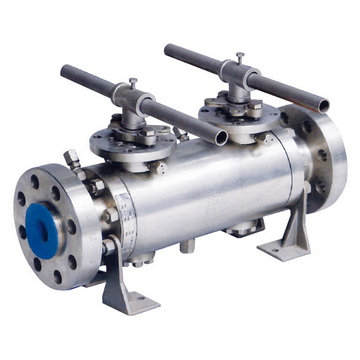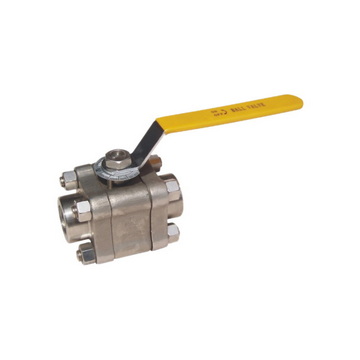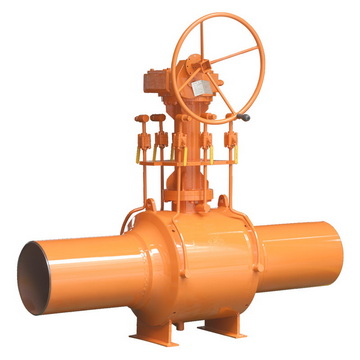How to Choose the Right Flanged Ball Valve for Your Pipeline
Content Menu
● What is a Flanged Ball Valve?
● Key Features of Flanged Ball Valves
● Types of Flanged Ball Valves
>> 2. Trunnion Mounted Ball Valve
● Material Selection for Flanged Ball Valves
● Pressure and Temperature Considerations
● Size and Connection Standards
● Advantages of Flanged Ball Valves in Industry
● OEM and Customization Services
● Installation and Operation Tips
● Frequently Asked Questions (FAQs)
>> 1. What is the main difference between floating and trunnion mounted flanged ball valves?
>> 2. Can flanged ball valves be used in seawater applications?
>> 3. How often should flanged ball valves be maintained?
>> 4. Are OEM flanged ball valves customizable?
>> 5. What flange standards do your flanged ball valves conform to?
Choosing the right flanged ball valve for your pipeline is crucial to ensure reliable operation, safety, and longevity of your system. Flanged ball valves are widely used in industries such as oil and gas, seawater desalination, and offshore drilling platforms. These valves provide robust sealing, easy maintenance, and excellent flow control.

What is a Flanged Ball Valve?
A flanged ball valve is a type of quarter-turn valve that uses a hollow, perforated, and pivoting ball to control the flow of liquids or gases. The valve connects to the pipeline using flanges on both ends, which are bolted to the adjoining pipe flanges. This mounting method provides a secure, leak-proof connection ideal for high-pressure, high-temperature, or aggressive fluid environments.
Flanged ball valves are designed to offer tight sealing with minimal leakage, making them particularly suitable for critical pipeline systems. The flange connection also simplifies installation and removal compared with welded or threaded connections, which is an important factor for systems requiring regular maintenance or inspection.
Key Features of Flanged Ball Valves
Flanged ball valves have several key features that make them an excellent choice for demanding pipeline applications:
- Durable and reliable sealing that prevents leaks
- Easy installation and removal thanks to flanged connections
- Compatibility with high-pressure and high-temperature environments
- Minimal pressure drop across the valve due to the streamlined flow path
- Full 360-degree rotation for quick shutoff or flow regulation
- Available in different types such as floating and trunnion-mounted designs to suit various operational needs
Types of Flanged Ball Valves
Understanding the types of flanged ball valves helps to select the most suitable valve for your pipeline. The three main types are:
1. Floating Ball Valve
This design features a ball that is held between two seats but free to move slightly. The fluid pressure pushes the ball against the downstream seal, enhancing sealing effectiveness. Floating ball valves are commonly used in small to medium sizes and moderate pressure applications.
2. Trunnion Mounted Ball Valve
Designed for larger diameters and higher pressures, the ball is anchored by a trunnion shaft, which absorbs pressure forces and reduces torque needed to operate the valve. This provides increased stability and longer service life under demanding conditions.
3. Top-Entry Ball Valve
A top-entry design allows for valve seat and ball maintenance or replacement without removing the valve body from the pipeline. This feature is valuable in industries where downtime must be minimized, such as offshore oil rigs.
Material Selection for Flanged Ball Valves
Choosing the correct materials for your flanged ball valve is critical, especially in harsh environments like chemical plants, offshore platforms, or seawater desalination facilities. Materials must withstand corrosion, erosion, and mechanical stress.
- Stainless Steel: The most widely preferred material for flanged ball valves due to its corrosion resistance, mechanical strength, and suitability for a wide temperature range. Ideal for seawater and chemical applications.
- Carbon Steel: Typically used in less corrosive environments or where cost constraints exist. Usually combined with special coatings to improve resistance.
- Special Alloys and Duplex Stainless Steel: For highly aggressive media or extreme pressure/temperature conditions, alloys such as Hastelloy, Inconel, or duplex stainless steel offer superior performance.
The choice of sealing materials is equally important, with options including soft seats like PTFE or PEEK for general applications, and metal seats for high-temperature or abrasive fluids.

Pressure and Temperature Considerations
Flanged ball valves are engineered to handle a wide range of pressures and temperatures. It is vital to select one with ratings that exceed the maximum expected operating conditions to ensure safety and durability.
- Valves for upstream oil and gas applications typically require higher pressure ratings (Class 600 and above) and materials that withstand extreme temperature variations.
- For seawater desalination or offshore platforms, resistance to saltwater corrosion and pressure fluctuations is essential.
- Valve pressure ratings should align with pipeline specifications, and temperature limits must consider not only fluid temperature but also ambient conditions and operational cycles.
Size and Connection Standards
Valves must fit the pipeline perfectly for optimal performance. Flanged ball valves come in various sizes, typically ranging from small diameters below 1 inch to massive sizes above 24 inches used in large pipelines.
Flanged connections follow international standards such as ANSI/ASME, DIN, and JIS to ensure compatibility and interchangeability across global markets. Selecting a valve with the correct flange rating (e.g., Class 150, 300, 600) is necessary for proper sealing and mechanical support.
Advantages of Flanged Ball Valves in Industry
Flanged ball valves offer multiple benefits for various sectors:
- Leak Prevention: The bolted flange connection plus advanced sealing prevents leaks, enhancing environmental safety.
- Easy Maintenance: Flanged design enables quick disassembly and reassembly for inspections and servicing without cutting pipe sections.
- Versatility: Useful across hydrocarbons, chemicals, seawater, and process fluids.
- Robust Construction: Can withstand mechanical shocks, vibrations, and harsh external conditions common on offshore platforms or heavy industry.
- Enhanced Flow Control: Ball design provides minimal flow resistance, reducing energy consumption in pumping systems.
OEM and Customization Services
We focus on providing OEM flanged ball valves tailored to your exact pipeline needs. Customization options include:
- Material grades tailored for specific corrosion or temperature challenges
- Special flange drilling patterns and dimensions to fit unique pipeline layouts
- Customized coatings, such as anti-corrosion or anti-fouling treatments
- Compliance with industry-specific certifications (API, ISO, PED)
Our expertise ensures your customized valve will perform reliably while integrating seamlessly into your system.
Installation and Operation Tips
Proper valve installation is fundamental to optimize performance:
- Align flanges carefully during installation to avoid gasket damage and leaks.
- Ensure bolts are tightened to recommended torque specs in a star pattern to distribute force evenly.
- Avoid rapid valve actuation, which can cause water hammer effects and damage.
- Establish routine inspection schedules to detect early wear or seal degradation.
- Consider valve automation for remote or frequent operation to improve safety and reduce manual labor.
Safety and Testing
Select valves from suppliers who provide stringent quality assurance, including:
- Hydrostatic testing to verify pressure-holding capability
- Fire-safe certification for use in hazardous areas
- Non-destructive testing (NDT) for weld integrity
- Dimensional inspections to meet exact flange tolerances
These tests help reduce downtime and prevent accidents caused by valve failures.
Conclusion
Selecting the right flanged ball valve for your pipeline is essential to guarantee optimal performance, safety, and longevity of your system. By carefully considering the application environment, material choices, pressure and temperature ratings, size, and connection standards, you can ensure your pipeline operates efficiently and safely. Flanged ball valves provide reliable sealing, easy maintenance, and versatile application across industries such as oil and gas, seawater desalination, and offshore platforms. Our Chinese factory specializes in OEM services, offering customizable valves that meet global standards and specific customer requirements. Contact us today for expert advice and customized solutions to optimize your pipeline infrastructure.

Frequently Asked Questions (FAQs)
1. What is the main difference between floating and trunnion mounted flanged ball valves?
Floating ball valves feature a ball that moves slightly to seal against the seat under pressure, suitable for smaller and medium sizes. Trunnion mounted ball valves have the ball fixed in place by a shaft, reducing operating torque and improving performance in large/high-pressure applications.
2. Can flanged ball valves be used in seawater applications?
Yes, valves made from corrosion-resistant materials such as stainless steel or special alloys are highly suitable for seawater desalination plants and marine environments.
3. How often should flanged ball valves be maintained?
Maintenance frequency depends on operating conditions, but typically annual inspection and servicing of seals, gaskets, and bolts are recommended to maintain valve integrity.
4. Are OEM flanged ball valves customizable?
Absolutely. Our factory provides full OEM customization, including material selection, flange specifications, seals, and coatings to meet specific project requirements.
5. What flange standards do your flanged ball valves conform to?
Our valves conform to major international standards, including ANSI/ASME, DIN, and JIS, ensuring wide compatibility and easy integration.
Hot tags: How to Choose the Right Flanged Ball Valve, Flanged Ball Valve Selection Guide, Best Flanged Ball Valve for Pipelines, Choosing Flanged Ball Valves for Industrial Use, Flanged Ball Valve Buying Guide, Flanged Ball Valve Size and Pressure Ratings, Tips for Selecting Flanged Ball Valves, Flanged Ball Valve Applications in Pipelines, Right Flanged Ball Valve for Your System, Pipeline Flanged Ball Valve Selection